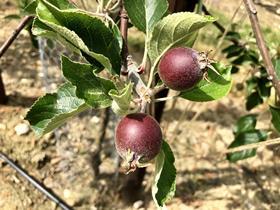
Apple growers have warned that there could be a lower than expected yield for the coming season due to the cold weather at the end of March.
AC Goatham & Son, the largest British topfruit grower, said the so-called 'June drop' - which occurs eight weeks after flowering and continues into July - has been much higher than anticipated thanks to the unseasonably low temperatures at the start of spring.
Young fruitlets are shed naturally by the trees during June drop, due to issues such as poor pollination or weather conditions after flowering begins. Thinning would normally then take place by hand, but this year it is being held back so that too many fruits are not removed.
Nigel Stewart, technical director at AC Goatham & Son, explained: “This is incredibly frustrating after what promised to be a perfect start to the season. The prolonged cold and cloudy weather which was experienced in many parts of the south east during the early spring is the cause of this excessive June drop.
'The ground was simply still too cold once the blossom began to flower and the trees were not ready to support a full crop. We had anticipated an increase in the number of apples we would grow this year due to our major programme of new orchard planting. It is hoped that our harvest will be of a similar size to the 2017-18 season, but we are still evaluating the crop and it could be lower.”
The likely outcome is a shorter British apple season in store, Stewart added, with supplies likely to run out several weeks earlier than hoped, depending on further conditions.
'We are now nervously watching the weather, to see if there is a break in the hot spell, which may trigger storms where hail could also have a devastating effect.”
Other leading growers have suffered similar issues, with fellow Kent grower Paul Mansfield reporting a similar level of June drop across his orchards. “British growers like myself and AC Goatham & Son have both been investing in major new orchard plantings over the last several years and we would have expected to achieve much greater potential this year thanks to that,' Mansfield said. 'Unfortunately, we just can’t control the weather and for a second year it has played a significant role in the volume of quality British apples available.”



